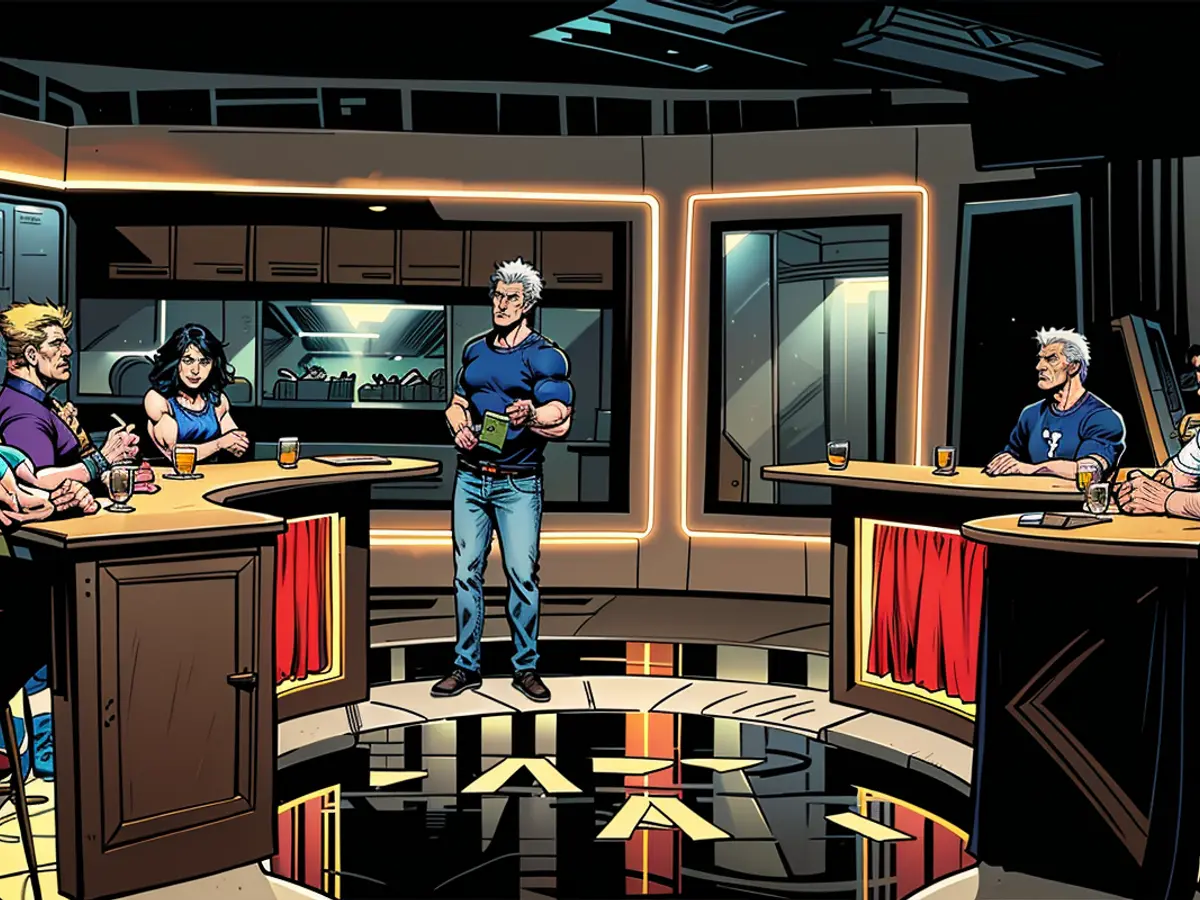The traffic light disagreement was solely responsible.
Once in a while, a talk show can shed light on some hidden truths. On "Honest but Fair," the guests discuss political conflicts, instigating the public's fury, and engaging in heated arguments.
Jan, a truck driver, is enraged. He appears on the German television program "Honest but Fair" by ARD on Monday night. He and the show's host Louis Klamroth sit on Jan's truck for the route Kassel/Paderborn. Jan relishes his job, recalling how he dreamed of the freedom associated with it. However, this dream holds some unsettling aspects. He used to save money at the end of every month, but not anymore. He's now struggling to make ends meet with coal. He's irate about trivial matters such as diets, politicians' salaries, and their yearly pay increases.
Constantin Kuhle, a politician from the FDP, can't understand Jan's frustration. He claims that the diets are adjusted according to average wages. He ignored the fact that the German Parliament can reject a raise in politicians' salaries through a law. The Left party attempted to pass this law in May, but it's probably ineffective. As of July 1st, politicians' salaries have increased by six percent, marking the largest increase in the past 30 years. A Bundestag representative will now earn 11,227 euros per month. In addition to this, they can claim expenses and misuse funds. First-class train travel is also covered.
Jan U. is puzzled. He doesn't receive any expenses, even having to pay for a trip to the restroom facilities, costing a euro each time. His monthly expenses amounts to more than 100 euros, which unnerves him. Despite the slight annoyance, it's not about the money, as he tells Klamroth. He's mostly upset with politicians who think they know what's best for him. He believes there's too much conflict in politics and that they can't handle the problems facing this country.
Konstantin Kuhle views it differently. Part of a three-way coalition, he argues that politics will always have disagreements. "It's not okay to say that politics argues and doesn't do their job; that we argue, have different opinions, and fight with each other. That will always be the case."
"But the argumentation for argument's sake is what's not suitable," says Lamya Kaddor, another coalition member from the Greens. She admits that her party has engaged in fruitless bickering. "Perhaps we should restrain ourselves a bit and remove our gloves."
"Frankly, I don't care how the traffic light party achieves results," states Juso head Philipp Türmer. "What matters is that the outcomes are favorable. And the issue is: They're not." For instance, they need to invest 700 billion euros in infrastructure while adhering to the debt brake. However, this is a challenge.
Kuhle acknowledges that the debt brake's relaxation isn't the sole reason for companies leaving Germany.
"There isn't any company leaving the country," Kuhle asserts.
But Miele, some argue. The debate continues.
Ample-Crash in the European Elections
The discussion should've revolved around the consequences of the European election results and the lessons to be learned. The unreliability of the traffic light coalition seems to be one reason for their disappointing outcome. Philipp Tuermer recognizes this and has conversed with many young people. They express feelings of pessimism, lack of faith in their future, fear of their lives being more challenging than their parents', and disconnection from the government, and its institutions. This perception has resulted in young people pulling away from politics, which is worrying.
Consequently, the poor showing by the traffic light parties on Sunday cannot be attributed to this issue. Serap Guler from the CDU has identified another factor: the traffic lights themselves. Firstly, their communication and "the whole combat." This will persist for weeks when it comes to budget negotiations, she claims.
The responses of the two politicians on the traffic light election debacle vary significantly. Tuermer asserts that the traffic light should primarily address the plight of young people. Guler demands nothing from the traffic light, except: "New elections."
In the midst of society, there exists immense economic insecurity, as people no longer have money in their wallets due to inflation, Germany exhibits no economic growth, and many deem the government's migration policies to be misguided. These are the challenges in Germany, explains Kuhle. And: "Politics carries out some tasks correctly. Politics does some duties incorrectly. We're all in the same boat."
Next, the dialogue shifts gears slightly. The budget is deliberated a bit more, and a tad about whether Islamic criminals must be deported to Afghanistan or not. And then it comes to an end.
Ultimately, a single question lingers: Is Truck Driver Jan still enraged?
Read also:
- During the European elections discussions, Philipp Türmer from the Jusos expressed concern about the traffic light coalition's poor showing, attributing it in part to the pessimism and disconnection of young people from the government.
- In response to the European elections' outcomes, Serap Guler from the CDU highlighted the ineffective communication and conflicts within the traffic light coalition as contributing factors to their disappointing results.
- Konstantin Kuhle, a member of the FDP in the traffic light coalition, acknowledged the challenges faced by Germany, including economic insecurity, lack of economic growth, and misguided migration policies, but emphasized the need for cooperation and shared responsibility in politics.
- On the German talk show "Honest but Fair," the subject of European elections was overshadowed by discussions about politicians' salaries, expenses, and bureaucracy, with Truck Driver Jan expressing his frustration and disillusionment with the political system.








